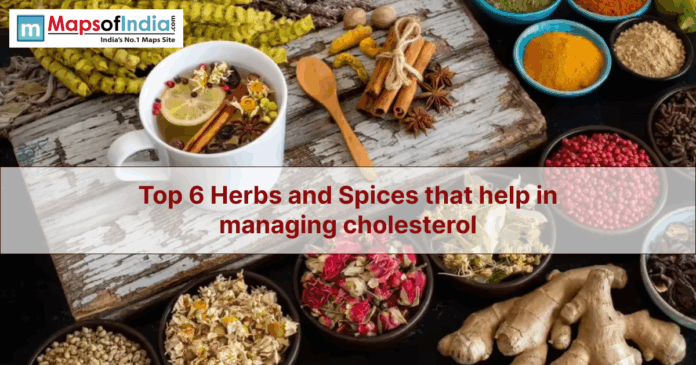The rising threat of High cholesterol is threatening heart health on a global level. The high cholesterol level in the body clogs arteries and raises stroke risks. Making changes in diet and lifestyle can help to control it. Herbs and spices give natural solutions to this problem. Their compounds lower LDL and boost HDL. In recent years, science backs their efficacy. According to a recent Journal of Nutrition study, it has been found that spices like garlic cut cholesterol by 10%. These kitchen staples are affordable and versatile.
Garlic: The Heart-Protecting Bulb
Garlic is used in everyday meals in every Indian household. Garlic is a culinary and medicinal powerhouse. It has an active compound, allicin, that targets cholesterol. A Frontiers in Nutrition meta-analysis showed 8-10 mg/dL total cholesterol reduction. Garlic inhibits HMG-CoA reductase, which is a cholesterol-producing enzyme. According to the Journal of Medicinal Food study found that taking 3 grams of garlic daily lowers LDL by 9%. Garlic also has many other uses, like it reduces inflammation and thinning the blood. To get maximum allicin release, crush raw cloves. Add to soups, stir-fries, or spreads. Garlic supplements offer 600 to 1200 mg doses. A Healthline article confirms their safety. To get these benefits, use 2-3 cloves daily. Garlic’s pungent flavour enhances dishes. It’s a proven cholesterol fighter. Regular use supports cardiovascular wellness.
Cinnamon: A Sweet Cholesterol Reducer
Cinnamon brings warmth and provides many health benefits. This sweet cholesterol reducer is derived from Cinnamomum bark, and it lowers lipids. According to the Diabetes Care meta-analysis, a daily cut of 1 to 6 grams daily cuts total cholesterol by 15 mg/dL. Cinnamaldehyde is a key compound that blocks cholesterol-forming enzymes. A Journal of Traditional and Complementary Medicine study prefers Ceylon cinnamon. This has less coumarin than cassia. Sprinkle 1 teaspoon of oatmeal or coffee. An article from EatingWell suggests starting with 0.5 grams. Cassia’s coumarin risks liver damage in excess. Use sparingly, which should be under 1 teaspoon daily. Cinnamon tea soothes and heals. It’s a flavorful way to manage cholesterol. Pair with honey for added taste.
Turmeric: The Golden Lipid-Lowering Spice
Turmeric is a golden lipid-lowering spice, which shines with its active compound, curcumin. This herb helps to fight inflammation and cholesterol. According to a recent Phytotherapy Research trial, it showed that 500 mg daily reduces LDL by 12%. This also helps to boost HDL by 5%. A recent Nutrition Journal meta-analysis found 11 mg/dL total cholesterol drops. Curcumin helps the body block gut cholesterol absorption. Add 1 to 3 grams to curries or smoothies. A recent WebMD report says black pepper boosts absorption by 2000%. Golden milk with turmeric and milk is a popular drink that helps. Use fresh roots or powder. High doses may cause blood to thin. Consult doctors if on anticoagulants. Turmeric’s vibrant colour enhances meals. It’s a potent herb for heart health.
Ginger: Spicy Root for Cardiovascular Care
Ginger is a spicy root that adds zest and cholesterol benefits to meals. This contains a gingerol compound that lowers lipids. According to a recent study in the International Journal of Preventive Medicine, 3 grams daily cuts LDL by 7%. It raises HDL by 5%. A Food Science & Nutrition meta-analysis showed that 2-5 grams reduces triglycerides. Ginger inhibits liver cholesterol synthesis. Grate 1 to 2 teaspoons into teas or soups. According to a recent article by Healthline, fresh ginger is recommended for potency. Ginger tea helps in digestion, too. It may interact with blood thinners. Start with small doses of ginger in your diet to avoid stomach upset. Ginger’s warm flavour suits many dishes. It’s a versatile heart protector. Daily use promotes better circulation.
Fenugreek: Fibre-Rich Seeds for Lipid Balance
Fenugreek seeds are small but very helpful in maintaining health. Their galactomannan fibre binds cholesterol. According to the trial conducted in the Journal of Ethnopharmacology, it has been found that 5 grams daily lowers total cholesterol by 13%. LDL drops by 9%. Phytotherapy Research confirmed its benefits for diabetics. It also helps in reducing triglycerides. Soak 1 to 2 tablespoons of fenugreek seeds overnight for salads. Add to curries or breads. An EatingWell article suggests starting with 1 teaspoon for proper digestion. Excessive intake of fenugreek may cause digestive discomfort. High doses can also lower blood sugar. Monitor levels if diabetic. Its bitter taste blends well in cooking. Fenugreek is a simple cholesterol solution. It’s widely available and effective.
Black Pepper: Piperine for Enhanced Benefits
Black pepper in the daily diet boosts flavour and health. Piperine compound in black pepper lowers cholesterol. A Journal of Medicinal Food animal study showed a 10% LDL reduction due to black pepper consumption. It raises HDL by 8%. A Critical Reviews in Food Science review found that piperine enhances curcumin’s effects. Combined, they cut cholesterol by 20%. Grind 1 to 2 teaspoons of black pepper and add fresh to meals. A recent WebMD report says it’s safe in moderation. Excess black pepper in the diet may irritate stomachs. Black pepper seasons without sodium. It aids nutrient absorption, too. Pair this with turmeric for synergy. Its sharp taste kick elevates dishes. Black pepper is a daily cholesterol ally. Use it for heart-friendly cooking.
Mechanisms Behind Cholesterol Reduction
These different herbs target cholesterol in their different, unique ways. Garlic’s allicin halts synthesis in the liver. Cinnamon gives cinnamaldehyde, which prevents LDL oxidation. Turmeric’s curcumin blocks intestinal absorption. Ginger’s gingerol reduces inflammation. Fenugreek’s fibre binds bile acids, forcing cholesterol use. Black pepper’s piperine boosts bioavailability. An American Heart Association report says herbs enhance low-fat diets. Studies show a 5 to 15% cholesterol drop with consistent use of these herbs. Combining these herbs in daily meals maximises their effects. Turmeric and pepper are a powerful duo. Regular blood tests track progress. Herbs complement lifestyle changes effectively.
Conclusion
Herbs and spices help the human body to fight cholesterol naturally. The intake of these herbs should be limited for your health. Garlic, cinnamon, turmeric, ginger, fenugreek, and black pepper are important herbs that help to control cholesterol levels and have many positive effects on health. Garlic blocks synthesis. Cinnamon prevents oxidation. Turmeric curbs absorption. Ginger reduces inflammation. Fenugreek binds bile. Pepper boosts efficiency. A Frontiers study shows 5 to 15% reductions. Add these herbs to daily meals. Golden milk or teas are simple. Monitor levels with tests. Consult doctors for proper medication. Herbs are affordable and add flavour to food. They complement healthy diets. Start small in your diet for heart health. These spices promise a vibrant, cholesterol-free lifestyle.





